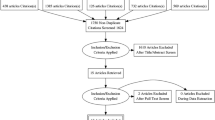Abstract
The kidneys are the most important organs to maintain homeostasis. In the assessment of renal functional disorders laboratory tests offer only indirect hints on location of the disease; radionuclide nephrography is hampered by low spatial resolution and radiologic methods provide only limited quantitative information. The MRI technique with fast pulse sequences and renally eliminated contrast agent has the capability of combining both anatomic and functional information. This article gives an overview on functional MRI of the kidneys with its possibilities and limitations. The clinical application of functional MRI allows a better understanding of some pathologic conditions such as urinary tract obstruction, renal insufficiency, effects of extracorporeal shock wave lithotripsy, different states of hydration, effects of drugs, vascular disorders, and effects of transplantation.
Similar content being viewed by others
Author information
Authors and Affiliations
Additional information
Received 12 May 1997; Accepted 17 July 1997
Rights and permissions
About this article
Cite this article
Knesplova, L., Krestin, G. Magnetic resonance in the assessment of renal function. Eur Radiol 8, 201–211 (1998). https://doi.org/10.1007/s003300050363
Published:
Issue Date:
DOI: https://doi.org/10.1007/s003300050363




